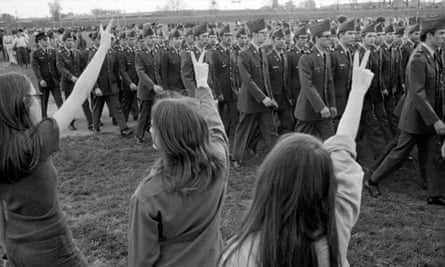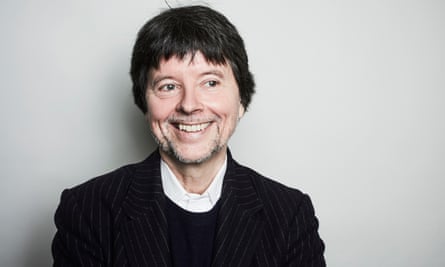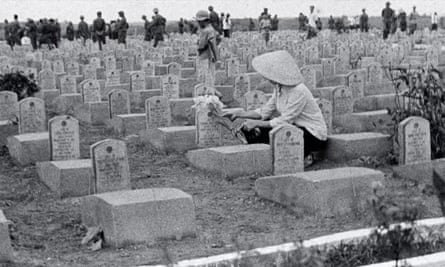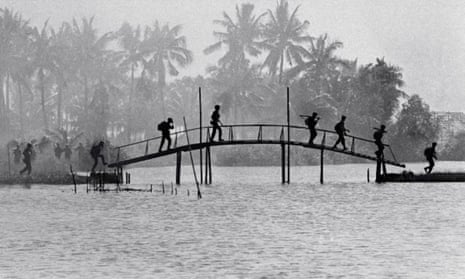Ken Burns surveyed the audience at the Kennedy Center in Washington and asked that anyone who served in the Vietnam war stand up. To prolonged applause dozens rose, among them Senator John McCain and former secretary of state John Kerry.
Then Burns asked everyone who had protested against the war to stand up too. Veterans including McCain joined the applause as they did so.
Then, spontaneously, some members of the two groups reached across the stalls and shook hands. Burns said he “couldn’t tell the difference” between them and expressed hope that this is how reconciliation begins.
“I thought that was kind of nice,” said Jim Greene, 72, who went to Vietnam in 1966 as a tank commander in the 2nd marine division. “Time heals most wounds.”
The gathering last Tuesday night went on to watch a 45-minute preview of The Vietnam War, a 10-part, 18-hour documentary about what Burns and his co-director Lynn Novick call the most important event in American history since the second world war.
The audience was gripped by a montage of clips played backwards – explosions imploding, missiles and parachutists spiralling upwards, flames leaping from thatched homes back into a weapon, a man shot at point blank range leaping magically back to life – and the thunderous clatter of helicopter blades and music from the era. But perhaps most potent was a vignette on the Vietnam war memorial in Washington, which included veterans breaking down in tears and an anti-war protester expressing regret for the way returning soldiers were abused.
“I’m sorry,” she sobbed, softly.

No one understands the divided states of America better than Burns, whose 1990 breakout series vividly exhumed the civil war through contemporary photography, music and letters. A century after that conflict, the Vietnam war left more than 58,000 Americans dead, triggered deep social unrest and sowed the seeds of the country’s present polarisation. The new film “offers an uncannily well-timed reflection of our current societal fractures”, the New York Times wrote, “a kind of origin story for the culture wars that still have us asking: Which side are you on?”
The culture wars are such that what you watch is a clue to how you vote. For Donald Trump supporters, it’s Duck Dynasty; for Hillary Clinton voters, it’s Modern Family. But Burns’s work – from The Civil War to Baseball, from Jazz to The Statue of Liberty, from The War (about the second world war) to The National Parks: America’s Best Idea – has always had crossover appeal.
“It’s good to sing songs together or have your epic verses sung around an electronic campfire,” he told the Guardian. “That’s what I’ve tried to do and I’ve been fortunate in my professional life that we get good ratings in the supposedly red states as well as the supposedly blue states, but it never crosses my mind when I’m making it that I’m not just making it for everybody.”
Vietnam, however, still contentious and contested, is a risky scab to pick. When Burns told Barack Obama he was working on a history of the war, the then president replied: “Oh, that’ll be your most controversial work.” Burns shot back: “Yes, but only among those who don’t watch it.” Obama laughed and said: “You need to remember that.” Burns replied: “Oh, believe you me, I will.”
He reflected this week: “It’s really true. I think it’s been borne out by the screenings we’ve done all around the country, 50 or 60 different screenings that no matter the audience – conservative, military, liberal, whatever – it’s been this cathartic experience and one that feels potentially healing.”

A decade of work and a thousand interviews – boiled down to nearly 80 on-screen –have gone into trying to make The Vietnam War balanced, bipartisan and 360-degree in perspective. On Tuesday, McCain called it “magnificent work” with lessons for the present. Burns said he and Novick have no political axe to grind but rather are “umpires calling balls and strikes” in the series, which premieres on America’s Public Broadcasting Service (PBS) on Sunday and BBC Four in the UK on 25 September.
He added: “I’m so interested in reaching across and I think this film has the ability to speak to experiences of people who voted, how ever much the intelligentsia might want to dismiss their intelligence, for the kinds of things that Trump appealed to. We’ve told their stories in an honourable fashion and we haven’t made them wrong, even though we’ve been able to contain many other perhaps even dialectically opposed positions.
“We can just honour a variety of perspectives and perhaps allow other people’s certainty to dissolve a little bit in the fact that more than one truth can obtain. As Wynton Marsalis said in my jazz series, sometimes a thing and the opposite of a thing can be true at the same time. Well, in war it may be dozens and dozens of things can be true at the same time.”
That includes the start of a conflict now perhaps best known to a younger generation through US-centric films such as Apocalypse Now, The Deer Hunter, Full Metal Jacket and Platoon. Vietnam was partitioned in a 1950s ceasefire between a communist north and anti-communist south. Washington supported a series of corrupt regimes against the communist-led Vietcong in the south and their allies in the north who sought to reunite the country.
This rapidly escalated in the mid-1960s when the US sent in thousands of air and ground forces. But as the draft deepened and casualties mounted, anti-war demonstrators took to the streets. Richard Nixon expanded the war into Cambodia and Laos but the quagmire continued. In 1973, US forces quit Vietnam, and in 1975 the south fell to the communists.
The PR-savvy Burns can reel off by rote the parallels with today: mass protests taking place across the country against the sitting administration; a White House in disarray, obsessed with leaks, and a president certain the press is lying and making up stories about him; asymmetrical warfare; a country divided over basic issues; big document drops of purloined stolen classified material that destabilise the public conversation; accusations that a political campaign reached out during the time of a national election to a foreign power to affect that election.
The office of the presidency has arguably never quite recovered or regained public trust. McCain, who spent five and a half years as a prisoner of war after his plane was shot down on a bombing mission, recalled: “Leaders didn’t lead, whether they were military or civilian. By telling the American people one thing, which was not true, about the progress in the war and the body counts, it caused a wave of pessimism to go across this country, which bolstered the anti-war movement.”
McCain and Kerry had input into the film, although they do not appear on camera, and production involved several trips to Vietnam to include an unprecedented number of Vietnamese voices. Burns explained: “We wanted to place a fresh face on that and a human face on that and to understand. What is I think so interesting is that our North Vietnamese soldiers and Vietcong guerrillas sound awfully like our American marines and GIs. They feel that about us and and our guys feel that about them.”

Based in Walpole, New Hampshire, Burns describes The Vietnam War as his most challenging and therefore most satisfying work. At 64, his status as a chronicler of the age through its most popular medium is assured. The historian Stephen Ambrose argued: “More Americans get their history from Ken Burns than any other source.” A 2002 poll by Real Screen Magazine ranked him and Robert Flaherty, of Nanook of the North fame, as the “most influential documentary makers of all time”. He has won dozens of awards including 15 Emmys.
In May last year, also at the Kennedy Center, Burns delivered the annual Jefferson Lecture for the National Endowment for the Humanities. He acknowledged his lifelong interest in the subject of race in America, manifest in series including The Cvil War, Baseball and Jazz.
“Slavery and its consequences, including the Civil War, are our original sin,” he told the audience. At the time, Trump was surging but the notion of him as president was still widely unthinkable.
“There is no contextual relationship in which you can put him,” he said. “I have always delved deep into race as the sort of central sub-theme of American life and I have received a lot of criticism even from friends and colleagues who just say enough already. And when Barack Obama was elected they said, ‘Now, will you finally shut up?’ and I held up The Onion which said, ‘Black man given worst job in nation,’ and said, ‘Just watch.’
“And they’ve all come back and talked to me as the Freddie Grays and Michael Browns have piled up and the treatment of Obama has been hysterically racist. So then I thought that Trump wouldn’t get traction but I also know that these things are deep seated and that we can appeal to the common denominator often a lot quicker than we can appeal to those better angels.
“It is not unlawful that a reaction to Barack Obama might be Donald Trump and it’s too bad that’s the case because it basically puts the United States on pause and doesn’t permit us what we have always done to move forward to understand our history was a rising road, as George Will characterised Franklin Roosevelt’s uber-optimistic view of things.”
Writing in the Atlantic, Ta-Nehisi Coates argues that Trump had made the negation of Obama’s legacy the foundation of his own. It often seems that the people least surprised by Trump’s victory were African Americans.
Burns said: “I have enough African American friends who at the end of ’15 and early ’16 were saying, ‘Oh, he can win.’ I tend to listen to them – scholars that I respect who are kind of bellwethers, almost canaries in the mine – and when they said he could win at that point I never let down my guard. African Americans occupy a unique place in American history and they are often privy to secrets that the rest of us can’t often hear.”
Trump has attacked the media as “damned dishonest” and “the enemy of the American people” and, according to Clinton, waged a “war on truth”. But Burns remains a trusted voice of authority to millions. He said: “I think that people are less and less interested in facts now, which suggests to me that facts are more and more important. So we didn’t spend 10 years on this to not try to get it right.”
Trump is an anomaly, Burns acknowledges, quite unlike any US president who has gone before. But the long view of history armours him against the hyperbole of the present and insists on a sense of proportion: the financial crisis of 2007-08 was not a catastrophe on the scale of the great depression; the present cleavage is hardly comparable with the civil war. This too shall pass.
“Vietnam, and the experience of doing that, and what I know about history, gives me a strange kind of optimism that this might in fact be some magnificent test of institutions, whether it’s judicial or intelligence or even Congress,” he said. “Certainly the press is undergoing a magnificent renaissance in the face of the assault on them.
“It’s all right to worry and be Chicken Little but I think the magnificence and the fearlessness of the response has been incredibly inspiring and will be incredibly helpful for our republic.”
